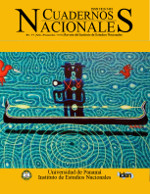

La otra frontera (1967) by César A. Candanedo is one of the archetypal novels of the Panamanian narrative of the central decades of the 20th century. This work addresses both the canal issue and the conflict that emerged as a result of the gradual operations of the transnational banana corporations. Until then, no one in the country had ever written anything about the latter. In a reality disturbed by the action of the agents of capitalism, the popular classes must rise and, following their leaders, take back their freedom through revenge and rebellion. Although the novel does not stand out for its formal elaboration, it does excel in its message of protest. The author uses the most relevant cultural discourses in the Panama of his time for the configuration of the content: nationalism, the questioning of the official triumphalist discourse and arielismo, among others. In fact, this article analyzes the presence of these cultural manifestations in La otra frontera and their role in the assembly of the plot.